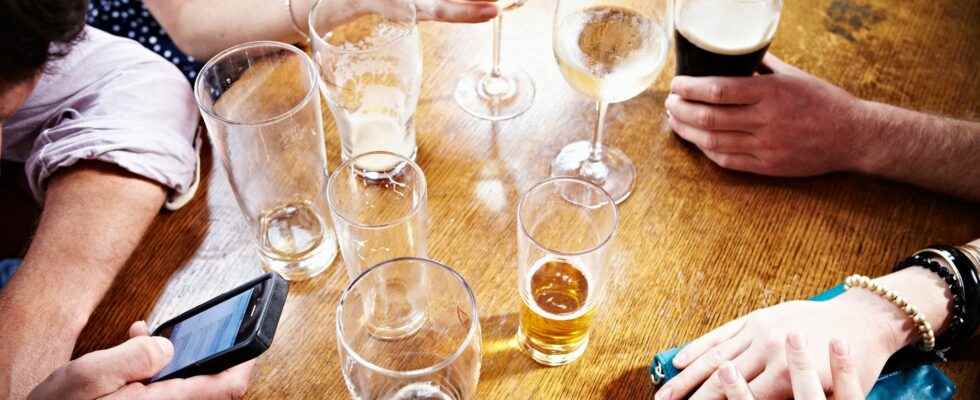To drink or not to drink? This is the question for many French people still intoxicated by the end-of-year feasts. On the one hand, the “Dry January” challenge encourages us not to swallow a single drop of alcohol for several weeks, with the key many benefits (weight, sleep, blood pressure, skin quality…). On the other hand, a new concept, the “Damp January” – or “wet January” – offers us to simply reduce our consumption, by fixing the quantities ingested ourselves. Liquor manufacturers obviously prefer this second version. But is it reasonable for our health?
A priori, any reduction, even partial, of alcohol consumption is beneficial. “If the people motivated by Dry January go to the end of their approach and at the same time other people, who did not feel capable of it, adopt a more moderate behavior, I only see good things because in both cases, it is an opportunity to become aware of our habits and to think about the beneficial effects that we could derive from a healthier lifestyle”, estimates Romain Gomet, addictologist doctor at the Albert- Chenevier de Créteil, board member of the Addiction Federation and the Association of young psychiatrists and young addictologists (AJPJA).
But it is still necessary to correctly gauge the thresholds not to be exceeded. Currently, Public Health France recommends not to drink more than two glasses daily and to observe at least two days of abstinence in the week. “By following these instructions, the chances of developing alcohol-related complications remain low. Unfortunately, for most French people, it is not easy to comply,” observes Romain Gomet.
Holy bread for the alcohol lobby?
Two glasses a day is often a bit short when it comes to celebrating a birthday or the New Year. “In France, maintaining social ties often involves an aperitif with alcohol”, laments Romain Gomet. At the same time, beverage manufacturers ensure that their beverages are attractive, which also promotes consumption. “I have the impression that the alcohol lobby is trying to take over this Damp January to counter the Dry January. They are basically telling us: do not opt for the most radical solution, consume a little. recalls another shift: over time, the slogan “alcohol abuse is dangerous for your health” has been transformed into “consume in moderation”. However, the two formulations do not have the same impact on a health point of view”, confides a doctor.
“You have to realize that the drinking thresholds are less severe than they should be. If we really wanted to reduce the chances of developing a complication to less than one in 1,000, we would recommend less than one drink per day”, explains Romain Gomet. Would the message be audible to the population? Not sure. Especially since everyone has their own conception of the container.
The equivalent of a small dosing balloon
For Public Health France, a standard glass of wine corresponds to 10 centiliters. Not necessarily the quantity served at home or even in the brewery. For beer, the recommended limit is set at 25 cl. So forget the pints and the strong alcoholic brands because for the health authorities, a normal beer displays 4 and a half degrees. With a can of 50 centilitres at 11 degrees, we therefore consume the equivalent of four or five glasses.
“The rules are even stricter for strong alcohols. In this case, the recommended threshold drops to 3 centilitres. To give you an idea, this is what is poured with a small measuring ball! We know full well that as an aperitif, this dose can be quickly exceeded”, notes Romain Gomet. In the case of whisky, for example, a somewhat large glass easily equates to two glasses for the health authorities.
These small excesses unfortunately favor the development of many disorders over a long period: colorectal, liver or breast cancer; cirrhosis, acute alcoholic hepatitis, chronic pancreatitis that can lead to diabetes, high blood pressure, stroke, fertility problems, sexual or psychological disorders… “We often mistakenly think that alcohol can help pass phases of anxiety and depression. But it’s the opposite. Its consumption increases the discomfort of patients”, adds Romain Gomet. “For all these risks, the less we consume the better,” says the specialist. And this advice applies to the whole year.
